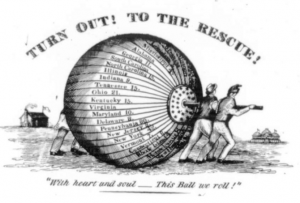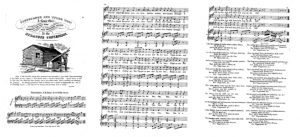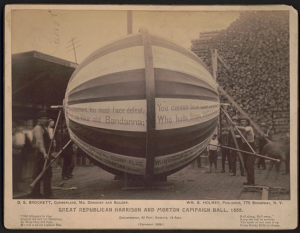Have you ever heard the expression “keep the ball rolling” and wondered about its origins?
An antecedent of the phrase stems from the British “keep the ball up,” but the phrase itself is only 180 years old and originated during the 1840 presidential election between Democratic candidate Martin van Buren and Wig candidate William Henry Harrison. In this election, Harrison’s presidential campaign introduced so-called victory balls – globes made from tin and leather, about ten feet in diameter, that were pushed from one campaign rally and from one town to the next. Photography was not around in the 1840s, of course, but according to illustrations from the time, these victory balls looked something like this:

But this is only the beginning of the story:
The expression “keep the ball rolling” entered common speech in part due to its popularization in the (unofficial) Harrison campaign song, written by Alexander Coffmann Ross, and entitled “Tippecanoe and Tyler Too.” William Henry Harrison’s campaign nicknames were “hero of Tippecanoe,” “old Tippecanoe,” or simply “Tippecanoe” for the 1811 battle between Native American and U.S. forces in Tippecanoe, Indiana; John Tyler was his running mate. The quite partisan and less-than-polite lyrics towards Martin Van Buren read:
Oh what has caused this great commotion, motion, motion,
Our country through?
It is the ball, it’s rolling on
For Tippecanoe and Tyler too.
For Tippecanoe and Tyler too.
And with them we’ll beat little Van, Van, Van,
Van is a used up man.
And with them we’ll beat little Van.
Here’s the sheet music, in an arrangement by G. E. Blake:

You can listen to an old-fashioned recording in the Smithsonian’s Folkways Recordings Collection or find a more modern version by They Might Be Giants on YouTube. And this isn’t even the only U.S. presidential election to feature victory balls – or campaign songs. Victory balls were revived for Benjamin Harrison’s 1888 campaign – and campaign songs have been with us for most elections since.

25,517 Total Views, 7 Views Today






